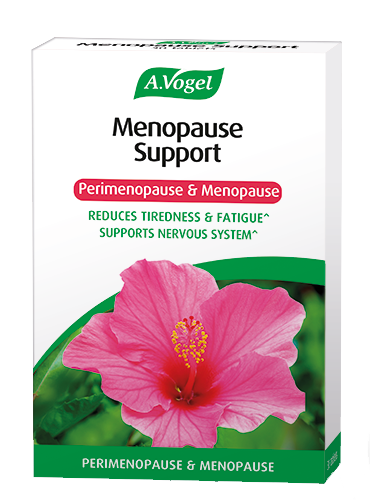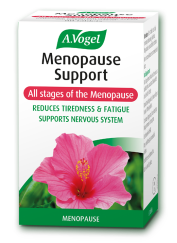Strange symptoms of perimenopause and menopause
During perimenopause and menopause, most of you will experience some of the common symptoms. But sometimes, you get these really strange, unusual, lesser-known symptoms, and sometimes I get all these messages asking, "Is this part of menopause? What's going on? Why am I feeling this because I've not heard of this, I've not read about it before?"
So, let’s take a look at three more of these symptoms that have come up quite recently:
1. Menopause flu-like symptoms
This is often called 'the menopause flu'. It's almost as if you're getting flu-like symptoms, maybe fever, chills, shivers, aches, and fatigue, but you don't get the other symptoms. You know yourself it's not a bad cold, because you're not getting the runny nose, or the mucus, or the coughs, or anything; but you know that something's going on.
This is very often just almost like a continuation of fatigue. So, if you're getting all these symptoms together, your body's basically just saying, "I've had enough. I need a rest. Please stop."
Often, it's just a one-off. Maybe you've been really busy, maybe you've had a lot of work to do, there's a lot of things going on either emotionally or physically, and then you end up feeling just kind of run-down and kind of flu-y. But if you feel that this kind of fatigue, and the fever, and the chills, and the shivering are on-going, if it's not abating, then be aware that symptoms like this can indicate an underactive thyroid. And we know that falling oestrogen levels in perimenopause and menopause can affect thyroid function. So, in this situation, if it continues, please just get this checked by your doctor to rule it out.
The other thing that can happen is that falling oestrogen levels can affect our immune system. And a lot of it is just due to the fact that all these physical changes are going on, and our body is finding it a bit of a struggle to stay on top of things. So, you may find that you are actually coming down with real colds, flu, and coughs, and you seem to be catching everything that's going around. That in itself can really wear you out. So, in that situation, you can look at the herb Echinacea, as this is known to support your immune system. And we have our Echinaforce tincture and tablets which are indicated for the relief and symptoms of colds and flu.
2. Stabbing pains
Now, this is not so much the tingling, but you just suddenly get a stabbing pain, or a shooting pain. Maybe the pains just come and go anywhere in the body and you never know when they are going to appear.
The main areas are the breasts, the chest area, the legs, and the stomach. So, I will look at these on an individual basis because they can be really quite different.
We know, generally, that falling oestrogen levels can affect nerve function. We know too that nutritional needs go sky-high. You need plenty of B vitamins and magnesium to support your nerves and cells. So, if your nutrition is a bit low, it could be just a really simple case of you needing a bit more magnesium and a vitamin B complex. But what can also happen is that having lower oestrogen increases our pain perception, so you can feel pain more than you did before. You may have had a few aches and pains generally before your hormones shifted, but suddenly you're getting a lot of joint aches and pains. So, that's just because your pain perception has changed, not that anything has gotten particularly worse.
Another thing that can happen is that your connective tissue can degenerate, or it's not being efficiently repaired. Now, connective tissue is like a kind of glue that holds your skeleton together. This connective tissue is flexible, and it helps you move all your different joints. If that connective tissue decreases, that will affect your joint movement and joint range, and that in itself can end up causing stabbing pains in the joints. And this is where basically areas like the knees and the hips can show up; so just be aware of that one.
For chest pain, there's something called costochondritis. This affects the tissue that connects the ribs together. If that gets inflamed, then anything you do that involves reaching up, turning round, moving back or forward, that's going to cause a stabbing pain. If the stabbing pain is connected to any type of movement, especially in the chest area, it’s really important to get this checked out by your doctor, just to make sure that it's not anything to do with your heart, rather than the ribs.
The other area where you can get these stabbing pains is the breasts. Again, it can just be due to low oestrogen levels affecting the oestrogen receptor sites in the breasts. It can be more cyclical. So, if you're in perimenopause, you may find that you just get the stabbing pains before a period is due. Some people find that a kelp supplement can help. We're not quite sure why. It's just one of these things - sometimes it can reduce discomfort.
It can be due to dehydration. Something as simple as that can cause breast discomfort and pain, so remember to keep your water intake up. But any breast changes, any breast pain, this needs to be checked by your doctor as well. Don't put up with this one for months and months, just get it checked out.
If you're getting stabbing pains in the stomach area – your abdomen or around your pelvis - it can be a number of things. It can be a prolapse. It can be due to the fact that the womb is changing. For some women, the womb tissue can shrink during perimenopause and menopause. For other women, it can actually get thicker. So, if the stabbing pains are coming with your cycle, whenever that comes, just get this checked out by your doctor.
If you're getting stabbing pains, especially when you sit down or you bend down, it could indicate a prolapse. Again, get this checked out by your doctor. This one's really important because there are all sorts of other issues. It can be due to polycystic ovaries or fibroids. If you're getting heavy bleeding at lots of different times, and stabbing pain, please get this checked by your doctor.
3. Dropping things & bumping into things
During perimenopause and menopause, your spatial awareness can change. So, you see the gaps between things differently. I know, for me, I could never park my car straight. No matter what I did, it always ended up at an angle. It could be you're bumping into doors. It could be you go to pick something up and completely miss it. So, all these different things can go on.
It can be your balance. You might find that your balance is getting a bit strange. That is often accompanied by tinnitus - a ringing in the ears. If you're getting a lot of balance issues and ear pain, just get that checked out by your doctor, in case it’s something called Ménière's disease.
It could be the shakes. Now, if you're starting to physically shake again, get this one checked out by your doctor. We do know that things like Parkinson's can develop later on, although as far as we know it's not linked to any hormonal changes; but just get that one checked out.
Low oestrogen levels can also affect our grip and the strength of our grip. And I know, for me, as time went on, trying to open jars was just an absolute nightmare. So, I've got one of those contraption things that you fix on and then you can screw it off quite easily. So, if you're losing finger strength, then you're more prone to dropping things because you just can't grip them tightly enough.
The other thing you can get is a grip-strengthening ball. This one is like a squashy ball, and you just practice exercising your fingers on a daily basis. If you find that it's your wrists that are affected, then things like yoga can be really effective for that as well, because some of the positions that they do can help strengthen your wrists.
Another thing to do is get your eyes checked. It's known that falling oestrogen levels can affect eyesight. It can affect eye pressure. So, the fact that you're bumping into things may have more to do with your eyesight than anything else. So, get regular checkups with your optician. Remind them or tell them that you're going through perimenopause or menopause, and then they can take this into account when you're getting your eyes checked.
I hope you found this one helpful. I talk a lot about strange symptoms, and I know whenever I post one of these, so many of you reply saying that you've experienced this and maybe didn't associate it with menopause. So, if any of you have any other strange symptoms that you've experienced, please mention them, and if I've not covered them before, then I'll try and put them in one of my future blogs. Remember, I always love hearing your stories and your comments, so please keep those coming in.
And until next time, take care and have a lovely week.
What else can help?
One extra thing before you go! Another way to support yourself at this time is to take a perimenopause and menopause supplement, such as A.Vogel's Menopause Support. This supplement contains soy isoflavones which are a source of phytoestrogens as well as the essential mineral magnesium, which can help support you in a number of ways including helping to reduce fatigue – the most common symptom of perimenopause and menopause, according to our online symptom checker.*
*correct as of 04/24
A.Vogel Menopause Support | For Perimenopause, Menopause & Postmenopause Symptoms
£8.99 (30 tabs) In Stock
You may also find these topics helpful:
6 strange sensations during menopause
Strange and weird symptoms of perimenopause and menopause Part 1
Strange and weird symptoms of perimenopause and menopause Part 2









